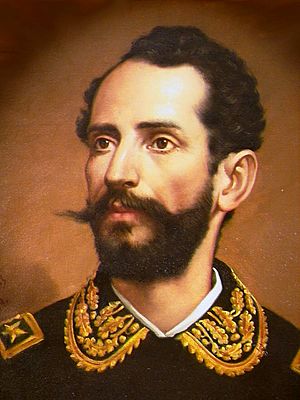Tomás Guardia Gutiérrez facts for kids
Quick facts for kids
Tomás Guardia
|
|
|---|---|
 |
|
| President of Costa Rica | |
| In office August 10, 1870 – May 8, 1876 |
|
| Preceded by | Bruno Carranza |
| Succeeded by | Aniceto Esquivel |
| President of Costa Rica | |
| In office September 11, 1877 – July 6, 1882 |
|
| Preceded by | Vicente Herrera |
| Succeeded by | Saturnino Lizano |
| Personal details | |
| Born |
Tomás Miguel Guardia Gutiérrez
December 16, 1831 Bagaces, Guanacaste |
| Died | July 6, 1882 (aged 50) Alajuela, Alajuela |
| Spouse | Emilia Solórzano Alfaro |
Tomás Miguel Guardia Gutiérrez (born December 16, 1831 – died July 6, 1882) was an important leader in Costa Rica. He served as the President of Costa Rica two times. His first term was from 1870 to 1876, and his second was from 1877 until his death in 1882.
Becoming President
Tomás Guardia was a general in the army. On April 27, 1870, he was part of a group of army officers. They removed President Jesús Jiménez from power. This event is known as a coup d'état.
After this, Bruno Carranza became president for a very short time. Tomás Guardia was the main person making decisions behind the scenes. After just three months, Tomás Guardia took over as president himself.
Important Changes in Costa Rica
One of the most important things Tomás Guardia did was create a new set of rules for the country. In 1871, he put in place the 1871 Constitution of Costa Rica. This set of laws was very important. It stayed in use for a long time, until 1948.
In 1876, Tomás Guardia stepped down from the presidency. Aniceto Esquivel became president. But even then, Tomás Guardia still had a lot of influence. He continued to guide decisions during Esquivel's short time in office. He also influenced the next president, Vicente Herrera.
Return to Power and New Laws
On September 11, 1877, Tomás Guardia became president again. He stayed in this role until he passed away.
Later that same year, he made another big change. He officially ended the use of the death penalty in Costa Rica. This meant that the government could no longer execute people as punishment for crimes.
See also
 In Spanish: Tomás Guardia Gutiérrez para niños
In Spanish: Tomás Guardia Gutiérrez para niños
 | Jessica Watkins |
 | Robert Henry Lawrence Jr. |
 | Mae Jemison |
 | Sian Proctor |
 | Guion Bluford |

